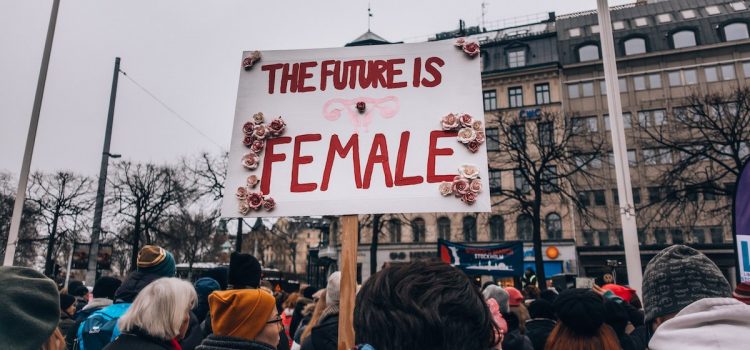

This article is an excerpt from the Shortform book guide to "Why We're Polarized" by Ezra Klein. Shortform has the world's best summaries and analyses of books you should be reading.
Like this article? Sign up for a free trial here.
What’s more important in American politics—issues or identities? What’s fueling the increasing political polarization in the country?
It seems that, more and more, America has an “us vs. them” mentality when it comes to politics. People used to discuss the issues; now, they talk about other people. Ezra Klein argues that this results in growing divisions among Americans.
Read more to learn about this troubling function of identity politics in America.
Identity Politics in America
Klein explores how political polarization works in contemporary politics, which leads him to the matter of identity politics in America. According to Klein, polarization creates a set of dynamics that make it a winner-take-all contest between the two parties. The dynamics of polarization, he writes, create a positive feedback loop: Partisan voters feel increasingly hostile toward one another and reward politicians who deliberately antagonize the other side, driving further rounds of polarization.
We’ll explore the underlying mechanics of this dynamic, looking at how identities trump issues in American politics, why our partisanship is driven primarily by negativity, and how these factors give politicians an incentive to stoke further division.
Klein observes that our partisan differences stem less from disagreements about what we believe than about who we are and who we believe our opponents to be. In other words, identities, not issues, are what drive our political behavior.
He writes that our disagreements run far deeper than straightforward economic questions like, “Will this bill help improve the roads in my town?” or, “Which candidate or party will help lower the cost of prescription drugs?” Instead, partisanship operates at a more fundamental, tribal level: We support the party that we believe represents people like “us” and that will help us defeat and punish the hated “others.”
(Shortform note: Although Klein argues that tribal, identity-based appeals are what matter most to voters in a polarized climate, some data seems to suggest the opposite. In a poll taken just before the 2022 midterm elections, registered voters still claimed to be basing their votes on substantive issues. The poll showed that 59% rated the economy as a top priority in determining their vote in the elections. The poll also showed 72% of voters ranking abortion rights as highly determinative of their upcoming vote.)
The Pull of Negative Polarization
In Klein’s analysis, these identity-based politics transform political competition into an all-or-nothing, us vs. them struggle marked by a phenomenon political scientists call “negative polarization”—we hate and fear the other political coalition more than we love and admire our own. In other words, loyal Democratic Party voters aren’t Democrats because they have deep love and admiration for the Democratic Party and all it stands for. Instead, they have an abiding fear of and hatred toward the Republican Party, and they view the Democrats as their only bulwark against them.
(Shortform note: American voting habits demonstrate just how strong a pull negative polarization exerts. Even though large swathes of voters profess a distaste for both major parties, those same two parties still combined for over 98% of the votes cast in the 2020 presidential election. Negative polarization can explain a lot of this voting behavior—a voter may not like her party, but she knows that sitting out an election or voting for a third party is tantamount to voting for the rival major party. And in our polarized system, voting for “our” party, even if we’re ambivalent about it, is vastly preferable to seeing the other party win.)
The Impossibility of Compromise
Klein writes that this level of extreme partisanship makes democratic governance all but impossible. After all, you can’t compromise or accept the normal give-and-take of democratic governance (like losing elections), because to do so would risk letting the hated other side “win.” And when your partisan rivals are feared and despised rivals who you believe want to destroy everything you cherish (instead of merely being a group that you disagree with on routine political matters), you’ll inevitably come to see every election as an ultra-high-stakes contest. Ultimately, writes Klein, both sides develop a mentality of winning at all costs—because the other side is simply too radical, dangerous, and different to be trusted with power.
| The Role of Norms in Democratic Functioning In How Democracies Die, Levitsky and Ziblatt write that healthy democratic functioning stems from adherence to political norms—the unwritten rules that govern political conduct. In systems where these norms are respected by all political actors, everyone agrees on what is and is not acceptable behavior. Crucially, they adhere to these bounds of behavior even if violating them may technically be permitted by the written rules. The two main democratic norms Levitsky and Ziblatt focus on are mutual toleration and institutional forbearance. They define mutual toleration as accepting the legitimacy of your political opponents and acknowledging their right to govern, as long as they win in free and fair elections. Institutional forbearance is the unwritten rule by which political actors agree not to use their control of institutions to marginalize their opponents. They describe these norms as guardrails that prevent political competition from getting too intense or the stakes of elections from getting too high—however, these norms can erode under the circumstances of extreme polarization outlined by Klein. When opposing parties come to see their opponents as too dangerous or “other” to be trusted with power, anything can be justified in the name of keeping them out of power. Levitsky and Ziblatt warn that this can lead to a democratic death spiral as each side engages in a tit-for-tat violation of norms until there’s no democracy left. |
Polarization Leads to More Polarization
Klein points out that the US political system operates according to the logic and incentives that our polarized society imposes upon it. He writes that divisive and fear-mongering politicians aren’t necessarily evil or malicious people. Instead, they’re responding rationally to their political incentives—and those incentives are to demonize and antagonize the other party. In other words, it’s politically advantageous for politicians to refuse to compromise and to stir up the most partisan reactions among their supporters. Electorally speaking, it pays to be a divider.
(Shortform note: Although Klein argues that politicians are rewarded by further polarizing the electorate—driving more polarization—some polling data appears to suggest the opposite. A December 2022 NPR poll showed that a supermajority of 74% of Americans want members of Congress to compromise and seek common ground with members of the other party. Eighty-two percent of Democrats expressed this preference for compromise, as did 78% of independent voters—although a notably smaller majority of 66% of Republicans expressed this desire.)

———End of Preview———
Like what you just read? Read the rest of the world's best book summary and analysis of Ezra Klein's "Why We're Polarized" at Shortform.
Here's what you'll find in our full Why We're Polarized summary:
- Why bipartisan cooperation is becoming increasingly difficult in the US
- The origins of modern political polarization and its impacts on the parties
- Ideas for how we might depolarize our politics






